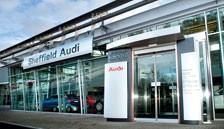“What’s in a name?” asked Juliet in 1597, trying to convince her new squeeze Romeo that it made no difference what he was called.
Although Shakespeare’s star-cross’d lover wasn’t talking about car retailing she had a point.
Does it matter what wording is used on dealership signage, particularly when it comes including the location in the name?
The bulk of the premium marques follow that strategy – Porsche, Audi, Mercedes and Lexus all christen their centres after the town or city in which they’re built.
BMW is the exception, but recently revealed exclusively to AM that it was considering making the change.
Prior to 2000, the Mercedes-Benz network had a mixture of name types and, according to Mike Whittington, sales director of M-B UK, there was total inconsistency.
“We instigated the change to location branding when we restructured the network to create consistency for the customers and for marketing activity,” he said.
Feedback now suggests customers find it easier to search for a dealership because they know what they need to look for, particularly if they’re outside their own area.
Whittington continued: “In 2000 the majority of dealers accepted that the primary brand of Mercedes-Benz was stronger globally.
"But where there was a family-owned business and a lot of equity in the local area, we had discussions where people wanted to keep their name.
"But ultimately the customers still get the ‘local brand’ experience, so it wasn’t an issue.”
Disconcerting if the name alters
Inevitably, dealerships change hands from time to time and customers can find it disconcerting if the name alters.
Whittington says that situation can give a poor impression of the manufacturer brand. In practical terms, location naming means no new signage is required.
Lexus has also been through a branding transition. When it launched in the UK in 1990, through to 1999 the cars were sold from within existing Toyota franchises.
Lexus sales and service had their branding – the vast majority of which were named after dealer groups – but when they went stand-alone that was ditched in favour of the word ‘Lexus’ and the area.
Belinda Poole, director of Lexus UK, wasn’t involved at the time, but said a pan-European decision was taken.
“We wanted a clear customer journey and part of that was clear and easily identifiable signage so people knew there was a Lexus dealership in the town.
"With only 50 centres nationwide, it allows for consistency of message.”
She believes it’s important for the customer to see Lexus Derby or Lexus Nottingham, rather than Lexus Inchcape – which operates both of those – and not know the location.
The impact of the name over the door is hard to measure, particularly in terms of customer retention.
“I hope it would improve it but I couldn’t give a definitive answer,” she said.
“Our Lexus centres have a strong reputation for customer service so we hope people feel Lexus centres are synonymous with that and retention comes afterwards.”
Experience most important factor
The alternative premium brands, such as Volvo, Saab and Honda, generally use retailer names for their sites.
Philip Crossman, head of dealer development at Honda (UK), said the manufacturer was introducing a new corporate identity across Europe which, for the purposes of consistency, would see only the word Honda on the dealership buildings.
“It’s commensurate with our values and product, and it’s the totem pole and all advertising materials that will carry the name of the dealership,” he said.
But to Crossman what’s above the door is insignificant compared with what happens when someone walks through it.
“The biggest element is the customer experience and that’s up to the dealership. The brand has to look welcoming, but what really matters is how people are treated inside,” he argued.
Crossman added that many Honda dealerships play a large part in their local communities and for that their own identity is crucial.
Graham Hales, CEO of branding consultancy Interbrand London, agrees. “Honda and others that use dealer branding are playing it differently to the likes of Mercedes and Lexus.
"Presenting a name on the dealership is designed to make the customer feel like that person is actually around in the business.”
Iconic manufacturer brands
Hales says that brands like Audi and Porsche are such icons that it’s reasonable to see the country divided up around centres which feature the area’s name.
He added: “There’s a degree of facelessness to it, but these brands don’t need that personality. Porsche dealerships should be a cathedral to Porsche-ness.
"It’s like Niketown stores are a celebration of that brand as much as places to sell stuff.”
Mike Steventon, automotive partner at consultancy firm KPMG, says the manufacturer brand is the primary driver in the eyes of the consumer, but the dealer brand can also be important if it’s recognised and trusted.
“Pendragon has developed the Stratstone name for its premium vehicles, which provides a consistent brand message across manufacturers and complements the manufacturer brand,” he said.
"Is this a trend which might expand outside the premium segment? Might customers buy a car from Cambridge Peugeot, not Marshall Peugeot in Cambridge?"
Daksh Gupta, chief executive of Marshall Motor Group, which has premium and mainstream franchises, said he wasn’t aware of any of the volume marques proposing to make the change to location branding.
But he could see it happening in the future because manufacturers invest millions of pounds in developing their brand.
Gupta continued: “I want customers to buy a car from Marshalls because we do a great job in customer service. If I can’t have Marshalls in the name, they’re not buying a Marshalls car,” he added.













Login to comment
Comments
No comments have been made yet.